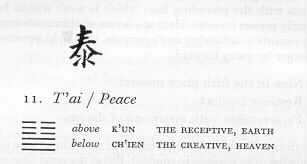
Peace
Presented August 24, 2000
Question: "I have just recently started training in the martial arts. I have found it difficult to concentrate on what is happening during my class time. I am easily distracted by everything around me. Is there anything that I can do to improve my ability to focus?"
The I Ching (The Book of Changes), Hexagram #11, T'ai or Peace, contains the answer to the problem of
restlessness and our inability to focus attention upon what we're doing.

When done with a tranquil spirit, all action brings success. In this hexagram we find the three broken lines of The Receptive, Earth, pressing down upon three solid lines of The Creative, Heaven. The strong lines of Heaven desire to move up and embrace the three weak lines of Earth. Heaven and earth will unite, and in this time of union, peace and harmony result. The flow moves up gracefully.
There are three fundamental elements needed to excel in the martial arts: efficient breath; efficient body; and efficient mind. These fundamentals are also called chi, jing, and shen.
Chi is linked to the breath. It is the primary source of energy within and outside of the body. Chi is maximized through breath training exercises, similar to those mentioned in my previous columns.
Jing, or form, is maximized through the physical movement and positioning of the body to include the internal organs and natural body chemicals, and so on.
This leaves us with Shen, the mind. The mind is the Yang general of the army. It is the initiator of all action and reaction. It is the source of awareness for the other two aspects of body and breath. The body and breath will not function if the mind is non-existent. One of the most important skills that temple monks acquire is their heightened perception and awareness. If a monk is able to anticipate a strike that is about to be launched - before it actually begins, he is obviously able to respond with lightning speed. This perceptive ability, a subliminal response, comes as the result of training in meditation.
We can improve our perceptive abilities in many ways by developing our meditative skills. But in order to do this we need to acquire tranquillity and for this we need to learn how to relax and to be more at peace with ourselves. The moment that our mindful awareness expands it embraces and subdues all the emotional yin. We can then focus upon the action and reaction of the art we are practicing. We will perceive many subtle things. Knowledge is power, and tranquil knowledge is wisdom.
Meditation teaches the mind how to relax and focus and to be in harmonious control of breath and body.
Think for a moment of your mind as Times Square in New York City at night. Imagine that your thoughts are represented by all of those lights. If a candle was placed in the open and you were flown several hundred feet above Times Square, would you be able to see the candle flame? No. If, however, while you were up there all of the lights in Times Square went out and only the candle was radiating light, you would be able to see the candle flame easily. Your ability to see the flame did not depend upon the brightness of the flame but rather on the brightness of everything around the flame. Meditation teaches you how to "turn off distracting lights". This ability will greatly enhance your martial art training. For a more in-depth discussion of meditation and a description of some methods of practice, refer to the Chapter 19 of the text, Seventh World of Chan Buddhism on our website.
Please feel free to email me with any comments or questions. cjs@hsuyun.org